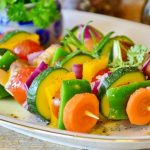
Being a vegetarian and an athlete has special challenges. A vegetarian athlete needs to pay close attention to nutritional and caloric intake so that his or her body has all the energy and nutritional requirements it needs to perform at high levels.
Most nutritional challenges of sports nutrition can be met by planning ahead and having a variety of foods available at home. Variety in your vegetables, fruits, nuts and seeds will assure the correct vitamins, minerals and essential amino acids in the diet.
Vegetarian sports nutrition must meet the energy needs of the athlete. Energy sources can simply be your favorite fruits, root vegetables, whole grains and green leafy vegetables.
Proteins, needed for repair of tissues, building and repairing muscles, red blood cell production and just running your body, can be received from fruits, green leaves, nuts and root vegetables. Some excellent sources of protein include avocados, dates, bananas, and almonds.
Protein requirements are not different for vegetarian athletes than for athletes who don’t eat a vegetarian diet. Athletes should take 1.2 to 2 grams of protein per kilograms of body weight.
Our bodies also require minerals to repair and replace muscles and hormones. There are several factors that are important to the absorption of minerals and vitamins. How the foods are combined, use of microwaves and incorporating the occasional fast all impact how minerals and vitamins are absorbed into the body.
Individual sources of plant protein do not supply all nine essential amino acids that meats and animal proteins do. However, eating a variety of vegetables during the day will supply all nine amino acids; what one vegetable is missing another will supply.
Calcium is also essential to nutrition. Vegetarian sports nutrition should plan for sources from plants or add supplements since athletes who are low may have increased risk of bone and stress fractures.
Athletes also are at risk for iron deficiency, especially females. Iron loss is increased during heavy training. Smart sports nutrition should incorporate spinach, a good supply of iron, into the diet. Vitamin C also improves iron absorption. The main symptoms of iron deficiency are weakness and rapid fatigue during exercise.
Low zinc levels can also be a problem for vegetarian athletes in heavy training. Zinc sources are pumpkin seeds, pecans, split peas, Brazil nuts, rye, whole wheat, oats, peanuts, walnuts and almonds.
Vegetarian nutrition should include appropriate amounts of energy, carbohydrates, protein, vitamins and minerals is critical for optimal performance. Athletes who practice a vegetarian lifestyle must do a little planning to ensure the correct balance of nutrition in their diets.
RESOURCES:
The Vegetarian Resource Group: Eating to Exercise and compete
http://www.vrg.org/nutshell/athletes.htm
Food and Nutrition: powered by Vegan
http://www.foodandnutrition.org/July-August-2013/Powered-by-Vegan-Must-Knows-for-Sports-Nutrition/
Organic Athlete: Sports Nutrition
http://www.organicathlete.org/publication/organicathlete-guide-to-sports-nutrition
Vegan Health: Sports Nutrition
http://www.veganhealth.org/articles/athletes
Sports Science: Effect of Vegetarian Diets of Performance in Strength Sports
http://www.sportsci.org/jour/0201/cf-e.htm
Hamilton Sports Medicine: Sports Nutrition fro the Vegetarian Athlete
http://www.hamilton.edu/documents/Sports%20Nutrition%20for%20the%20Vegetarian%20Athlete.pdf


